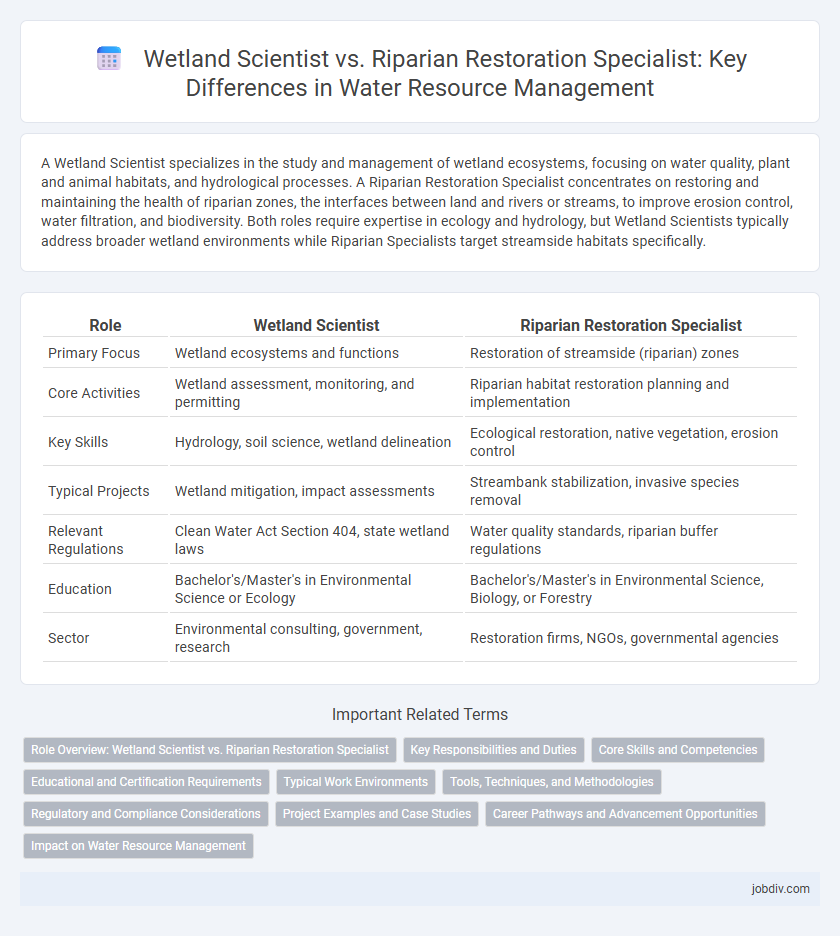A Wetland Scientist specializes in the study and management of wetland ecosystems, focusing on water quality, plant and animal habitats, and hydrological processes. A Riparian Restoration Specialist concentrates on restoring and maintaining the health of riparian zones, the interfaces between land and rivers or streams, to improve erosion control, water filtration, and biodiversity. Both roles require expertise in ecology and hydrology, but Wetland Scientists typically address broader wetland environments while Riparian Specialists target streamside habitats specifically.
Table of Comparison
| Role | Wetland Scientist | Riparian Restoration Specialist |
|---|---|---|
| Primary Focus | Wetland ecosystems and functions | Restoration of streamside (riparian) zones |
| Core Activities | Wetland assessment, monitoring, and permitting | Riparian habitat restoration planning and implementation |
| Key Skills | Hydrology, soil science, wetland delineation | Ecological restoration, native vegetation, erosion control |
| Typical Projects | Wetland mitigation, impact assessments | Streambank stabilization, invasive species removal |
| Relevant Regulations | Clean Water Act Section 404, state wetland laws | Water quality standards, riparian buffer regulations |
| Education | Bachelor's/Master's in Environmental Science or Ecology | Bachelor's/Master's in Environmental Science, Biology, or Forestry |
| Sector | Environmental consulting, government, research | Restoration firms, NGOs, governmental agencies |
Role Overview: Wetland Scientist vs. Riparian Restoration Specialist
Wetland Scientists specialize in assessing and managing ecosystems characterized by saturated soil conditions, focusing on habitat conservation, water quality monitoring, and regulatory compliance for wetland protection. Riparian Restoration Specialists concentrate on rehabilitating riverbank and streamside environments to stabilize soil, enhance biodiversity, and improve watershed health. Both roles require expertise in hydrology, ecology, and environmental regulations but differ in targeted habitats and restoration approaches.
Key Responsibilities and Duties
Wetland Scientists conduct hydrological assessments, monitor water quality, and evaluate wetland ecosystems to inform conservation strategies and regulatory compliance. Riparian Restoration Specialists focus on stabilizing stream banks, planting native vegetation, and implementing erosion control measures to rehabilitate degraded riparian zones. Both roles require expertise in ecological data analysis and habitat restoration but differ in their emphasis on wetland ecosystems versus streamside environments.
Core Skills and Competencies
Wetland Scientists excel in hydrology analysis, soil science, and plant ecology to assess and manage wetland ecosystems, ensuring biodiversity preservation and water quality improvement. Riparian Restoration Specialists possess expertise in streambank stabilization, native vegetation planting, and erosion control techniques to rehabilitate riparian zones and enhance watershed health. Both roles require proficiency in environmental regulations, GIS mapping, and ecological monitoring, with Wetland Scientists emphasizing wetland delineation and Riparian Restoration Specialists focusing on habitat restoration strategies.
Educational and Certification Requirements
Wetland Scientists typically hold degrees in environmental science, ecology, or biology and often require certification such as the Professional Wetland Scientist (PWS) credential from the Society of Wetland Scientists. Riparian Restoration Specialists usually possess educational backgrounds in natural resource management, hydrology, or environmental engineering, with certifications like the Certified Ecologist (CE) or specialized restoration training through the Society for Ecological Restoration (SER). Both roles demand strong knowledge of aquatic ecosystems, but certification paths provide focused credentials tailored to wetland science or riparian habitat restoration.
Typical Work Environments
Wetland scientists primarily conduct fieldwork in marshes, swamps, bogs, and other wetlands to assess ecosystem health and water quality. Riparian restoration specialists often work along riverbanks and stream corridors, implementing projects to stabilize soil and enhance aquatic habitats. Both professionals collaborate with environmental agencies, but wetland scientists are more frequently found in research institutions and government regulatory bodies.
Tools, Techniques, and Methodologies
Wetland Scientists utilize hydrological modeling, soil analysis, and vegetation surveys to assess wetland ecosystems, employing GIS mapping and remote sensing technologies for habitat monitoring. Riparian Restoration Specialists focus on bioengineering techniques, such as live staking and coir logs, combined with streambank stabilization and native plant propagation to restore riparian zones. Both disciplines integrate water quality testing, erosion control methods, and ecological assessments to support ecosystem resilience and biodiversity enhancement.
Regulatory and Compliance Considerations
Wetland scientists ensure compliance with the Clean Water Act by conducting wetland delineations and assessments to identify protected waters and wetlands, facilitating permit acquisition from agencies like the U.S. Army Corps of Engineers and the Environmental Protection Agency. Riparian restoration specialists focus on meeting local and federal regulations related to streambank stability, erosion control, and habitat restoration, often working within guidelines of the Endangered Species Act and state water quality standards. Both roles require detailed knowledge of environmental regulations, permitting processes, and habitat protection mandates to ensure projects meet legal requirements and promote sustainable water resource management.
Project Examples and Case Studies
Wetland Scientists focus on projects like the Everglades restoration, employing hydrological assessments and soil analysis to enhance wetland resilience, while Riparian Restoration Specialists lead initiatives such as the Yellowstone River riparian buffer zones, implementing native vegetation planting to reduce erosion and improve water quality. Case studies reveal Wetland Scientists' expertise in mapping and monitoring wetland hydrodynamics, contrasted with Riparian Specialists' success in stabilizing streambanks and restoring habitat corridors. Both roles contribute critically to water resource management, yet their project methodologies and ecological targets differ significantly based on wetland versus riparian ecosystem characteristics.
Career Pathways and Advancement Opportunities
Wetland Scientists focus on studying and managing wetlands to preserve biodiversity and water quality, often advancing through roles in environmental consulting, research, or regulatory agencies. Riparian Restoration Specialists concentrate on restoring riverbank ecosystems, progressing by gaining expertise in habitat restoration projects and environmental planning within governmental or non-profit organizations. Both careers offer pathways to senior ecological management, policy development, or environmental leadership positions emphasizing water resource sustainability.
Impact on Water Resource Management
Wetland scientists specialize in assessing and restoring wetland ecosystems, which play a critical role in natural water filtration, flood control, and habitat preservation, thereby enhancing water quality and availability. Riparian restoration specialists focus on rehabilitating riverbanks and streamsides, stabilizing soils to reduce erosion and sedimentation, which directly improves water flow and reduces pollution. Both roles significantly contribute to sustainable water resource management by promoting ecosystem resilience and maintaining hydrological balance.
Wetland Scientist vs Riparian Restoration Specialist Infographic

 jobdiv.com
jobdiv.com